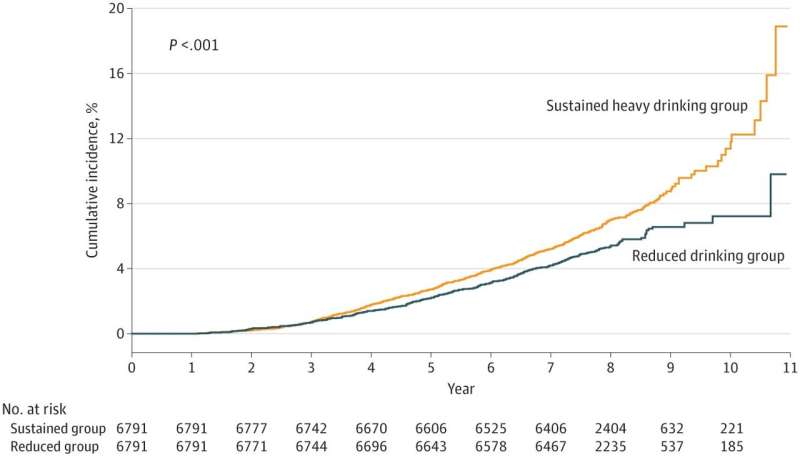This article has been reviewed according to Science X's editorial process and policies. Editors have highlighted the following attributes while ensuring the content's credibility:
fact-checked
peer-reviewed publication
proofread
Decreased alcohol consumption in chronic heavy drinkers reduces incidence of cardiovascular diseases

A research team has demonstrated that reducing alcohol consumption in chronic heavy drinkers can significantly reduce the risk of major adverse cardiovascular and cerebrovascular events. Their research paper "Reduced Alcohol Consumption and Major Adverse Cardiovascular Events Among Individuals with Previously High Alcohol Consumption" was published in the JAMA Network Open.
The collaborators include Prof. Dong Oh Kang and Prof. Dae-In Lee from the Cardiovascular Center of Korea University's Guro Hospital, Prof. Jin-Man Jung from the Department of Neurology at Korea University Ansan Hospital, and Prof. Jae-woo Lee from the Department of Family Medicine at Chungbuk National University.
Chronic heavy drinking is widely recognized as a major risk factor for cardiovascular and cerebrovascular diseases, including acute myocardial infarction and stroke. Previous studies have suggested that moderate alcohol consumption might have preventive effects against these diseases, often represented by U-shaped or J-shaped dose-response curves. However, these dose-response relationships have been inconsistent across different cardiovascular disease subtypes, and they have not directly proven the benefits of reducing alcohol consumption.
To address the limitations of prior research, the research team employed a risk prediction model based on changes in alcohol consumption among chronic heavy drinkers. They analyzed data from 21,011 chronic heavy drinkers aged 40 to 79, registered in the National Health Insurance Service health examination database, who underwent health examinations during two subsequent time periods (1st period, 2005–2008; 2nd period, 2009–2012).
Participants were categorized into two groups: a sustained heavy drinking group and a reduced drinking group. Heavy drinking was defined as consuming more than 56g (4 cups of drink) of alcohol per day or more than 196g (14 cups of drink) per week for men, and more than 42g (3 cups of drink) per day or 98g (7 cups of drink) per week for women.
Moderating excessive drinking habits reduces the risk of cardiovascular and cerebrovascular diseases, particularly angina and ischemic stroke
The study found that the reduced drinking group had a 23% lower risk of major adverse cardiovascular and cerebrovascular events compared to the sustained heavy drinking group. In particular, the incidence rates of angina and ischemic stroke were significantly lower, confirming the effectiveness of reducing alcohol consumption in disease prevention.
These benefits were consistently observed across various subgroups, regardless of comorbidities such as hypertension, diabetes, and hyperlipidemia, as well as differences in physical activity and socioeconomic status.
Prof. Dong Oh Kang and Prof. Dae-In Lee, the co-first authors of this study, stated, "This research provides a new perspective on the pathophysiological relationship between alcohol consumption and the development of cardiovascular and cerebrovascular diseases by focusing on changes in lifestyle behaviors rather than alcohol consumption at a single time point."
They emphasized the importance of moderating alcohol intake to prevent these diseases in chronic heavy drinkers.
Prof. Jin-Man Jung and Prof. Jae-Woo Lee, the corresponding authors, highlighted, "The most significant prevention effects were seen in cases of angina and ischemic stroke when alcohol consumption was appropriately controlled in chronic heavy drinkers."
They noted that these findings offer key insights for clinicians advising patients on the benefits of reducing alcohol intake to prevent cardiovascular and cerebrovascular diseases.
More information: Dong Oh Kang et al, Reduced Alcohol Consumption and Major Adverse Cardiovascular Events Among Individuals With Previously High Alcohol Consumption, JAMA Network Open (2024). DOI: 10.1001/jamanetworkopen.2024.4013


















